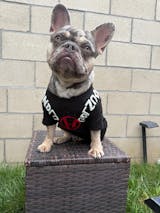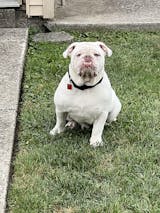Seasonal Allergies and Your Wrinkly Pup
With spring almost upon us, pet parents everywhere need to be aware of seasonal allergies in their furry friends. While any dog can suffer from seasonal allergies, the wrinkles and folds of certain breeds—like English Bulldogs, French Bulldogs, and Pugs—are especially prone to problems with allergens like pollen or grass. But, how do you tell if your pup is suffering from regular allergies or seasonal ones? Here’s what you need to know about seasonal allergies in dogs and tips on caring for them.

What Causes Seasonal Allergies?
Seasonal allergies occur when a dog comes into contact with allergens in their environment. Common allergens include pollen, dust mites, grass, mold spores, insect bites, etc. When exposed to these allergens, the dog’s immune system will react by releasing histamines, which can cause itching, redness and other skin irritations.
What's the Difference Between Seasonal and Regular Allergies?
The two types of allergies can be difficult to tell apart since they share similar symptoms. However, seasonal allergies are triggered by the environmental changes that come with spring and summer, whereas regular allergies are usually caused by something in their food or environment that they have been exposed to for a longer period of time.
How to Tell if Your Dog Has Seasonal Allergies
If your pup is exhibiting any of these symptoms—itching, redness, runny nose/eyes, it could be a sign that they have seasonal allergies. It’s best to have them checked out by vet so they can provide you with an accurate diagnosis. The vet may also suggest allergy testing or skin tests to determine the exact cause of the problem.
Caring for Doggos With Seasonal Allergies
Once your pup has been diagnosed with seasonal allergies, there are some steps you can take to help them feel better:
• Keep your pup away from known allergens: If possible, limit their exposure to things like pollen or grass. This is especially important for breeds with wrinkles and folds, as these areas can easily become contaminated by allergens.
• Groom your pup regularly: Regular grooming will help remove any particles that may be stuck in the fur or folds of the skin. Bathing once a week using an allergen-free shampoo recommended by your vet should also be part of the routine.
In between baths, use Squishface Wrinkle Wipes to keep your doggo clean. Our alcohol-free formula is gentle enough for even the most sensitive and allergy-prone dogs and can prolong the time in between baths.
After your dog is clean and dry use Squishface Wrinkle Paste to protect their skin and prevent it from becoming dry and flaky. Wrinkle Paste forms a water-repellent barrier on the skin surface which keeps moisture, yeast, fungus, and other bacteria away.
• Stay ahead of the drool: Let’s face it—wrinkly breeds are notorious for drooling, especially during allergy season when their mouths may become more irritated. Excess moisture trapped in skin folds can lead to even more itching or secondary infections. That’s why Squishface Slobber Towels are a must-have. Perfect for wiping down messy faces after meals or outdoor play, these ultra-absorbent towels help keep skin folds dry, clean, and comfortable. Bonus: they also help protect your furniture, clothing, and car from slobbery surprises!
• Give medications as prescribed: If the vet prescribes any medications, make sure to stick with the plan and give them to your pup as directed. Doing so will help control the itching and inflammation associated with seasonal allergies.
• Cover exposed skin: If your pup’s wrinkles or folds are particularly sensitive to allergens, try covering them up when you take them outdoors. This will help reduce their exposure to things like pollen or grass.
The Bottom Line
Seasonal allergies in dogs can be managed with proper care and treatment. By limiting their exposure to known allergens, grooming regularly, sticking with any medication prescribed by the vet, and covering up exposed skin when going outdoors, you can provide your pup with much-needed relief from seasonal allergy symptoms. If you have any questions or concerns about caring for a dog with seasonal allergies, don’t hesitate to speak to your veterinarian!
Be sure to follow us on TikTok, Instagram, Facebook, Pinterest, YouTube, and visit our blog weekly for more tips on caring for your wrinkly doggo, and the latest on all things Squishface!










